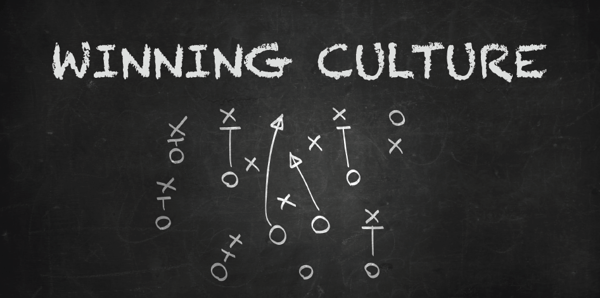
Does Your Company Have a Winning Culture? Draw Up a Playbook for Success
By Candace Coleman, CultureWise Content Manager
Many business leaders will tell you that their company’s most important asset is their team. And because they understand how valuable their people are, they make a conscious effort to provide competitive salaries and benefits. They strive to make employees feel like a part of the big picture and create an inviting workplace where people enjoy spending time.
Consequently, their staff may be relatively happy. But leaders who leave it at that overlook something just as important to employees as compensation, perks, and even being aligned with organizational goals.
Most people want more than to feel good about where they work; they want to feel great about what they do. They want to excel.
Instead of being satisfied with employees who seem content, leaders should activate the kind of company culture that will help them thrive. Why? It’s not only advantageous for the individuals who work for them; it’s great for business.
When people are proud of what they achieve personally, they’re more potent agents for organizational success. As they realize their increased value within the company, they become more vested in its capacity to prevail in the marketplace.
Helping employees shine can propel a business that has carved out an average market share to one that gains an edge over the competition.
A Team of Champions vs. a Team of Superstars
Great sports coaches make an effort to help team members achieve personal bests. They do it for several reasons; individuals who strive to hit successive benchmarks have more skill to offer the team. And people who perform at a high level are also happier and more confident—a contagious attitude that helps teams prevail.
But the same coaches are keenly aware that there’s a difference between cultivating a team of champions and a team of superstars.
Superstars may or may not be team players—their focus is often only on their own achievements. A team of superstars can have a hit-or-miss record because its players don’t align their talents.
Champions are different.
People who are coached to have a championship mentality focus on applying their best individual contributions to help the team triumph.
Business leaders should have the same outlook and goal as legendary sports coaches. If they empower employees to do their best work in a team-oriented environment, they won’t just see occasional wins. They’ll build a united staff of high achievers who can make their company a victor in the marketplace.
As Michael Jordan said, “Talent wins games, but teamwork and intelligence win championships.”
How Can I Help My Employees Improve?
A commitment to strengthening company culture can make an enormous difference in everyone’s performance level. But a high performing culture isn’t the same as one that merely stresses values or is put into place to boost people’s spirits.
A strong culture is built on sustaining the kind of behaviors that drive ongoing best performances for individuals and organizations.
Companies that help people internalize winning behaviors cultivate fulfilled, engaged employees who are team players.
Behaviors that Make Your Employees Excel
The first step in creating a winning culture is to outline behaviors that elevate personal performance and dovetail with company goals. Some of these behaviors center more on how employees work, and others focus on how management helps them succeed. Here are some great examples.
Winning Employee Behaviors
- Continuous improvement. Workers need to know that no matter how good a process, performance, or interaction is, it can always be better. They should be taught to adopt the mindset of never being satisfied with the status quo. Even small improvements made regularly will amplify the feeling of achievement.
- Careful listening. When employees hone their listening skills, they learn and understand more. It helps them declutter their minds to absorb the most value from what’s being said and use that information to do better work. It’s a skill that improves almost every part of someone’s job, and good listeners also become good leaders.
- Asking questions. People who are taught to question what they don’t understand and not accept anything at face value will constantly grow. Because they dig deeper, they’re fortified with more knowledge, see things from different perspectives, and increase their ability to pursue the best outcomes.
- Communication. Effective communication in business is a powerful skill that enables successful interactions with coworkers and customers. People are more likely to excel when they learn how to communicate so that others clearly understand what they’re saying. And they’ll make the most of collaborations when they’re taught the value of sharing information.
- Taking ownership. There is a specific pride that comes with “owning” a task rather than just working on it. Employees encouraged to take ownership of their responsibilities develop the kind of grit that allows them to navigate challenges. They learn to focus on and deliver results, and with that effort comes immense satisfaction.
- Commitment to learning. If workers are always open to learning opportunities, whether they are on the job or after hours, they’ll constantly improve their abilities. With a commitment to lifelong learning, they continuously expand their credentials and skillset. Each new learning experience allows them to perform at a higher level and bring more to the team.
- Working smart. No matter how hard people work, if they don’t understand how to stay organized and prioritize, they can’t perform at their best. Learning how to maximize their efforts helps them to efficiently achieve goals and rack up successes.
Winning Management Behaviors
- Acknowledgment. Even people who believe they are doing a good job need to hear it from others. Managers should routinely recognize team members for successes to encourage more great work. Once people know they are excelling, they want to continue that level of performance.
- Mentorship. Every great performer had a great teacher. Managers and supervisors should have a coaching mindset and encourage peer-to-peer mentors to strengthen people’s abilities. Part of good mentorship is providing useful feedback to help employees improve. And a mentorship relationship works two ways. Mentors also benefit because it is fulfilling to help others grow, and they’ll learn new ideas, strategies, and tactics from the people they coach.
- Leading by example. People thrive when they have good role models. A culture program that teaches specific behaviors is much more impactful when leaders embody them. Employees can process the information they’re learning by hearing and watching it in action. The message is much more authentic, and people will internalize it faster.
- Promoting team-first mentality. As noted above, it’s crucial to stress teamwork to prevent personal agendas from eclipsing company goals. But learning to be a solid team member also directly impacts individual achievements. In addition to strengthening interpersonal skills that drive success, being a team player means you always have a support system and a cheering squad.
- Setting Expectations. Employees need to know what they’re expected to do so that they can excel at doing it. Management must communicate expectations clearly so that people know how to meet or exceed them. This includes letting workers know how much leeway they have to be creative problem-solvers.
- Creating a blame-free environment. Workers can’t progress if they’re afraid of making mistakes. People who operate in a blame-ridden atmosphere will never take a chance to be innovative. Employees should be encouraged to have a solution-focus, which allows them to learn and grow from mistakes.
- Advocating a work-life balance. Burned out people can’t flourish. Managers should help employees dig down for their best performance, but they should also coach them to value their health and well-being. People who bring their best selves to work each day can sustain a high level of accomplishment.
Workers who achieve personal success want to keep up that momentum. They develop a growth mindset and become more resilient and proactive. They gain confidence, and their overall life view improves.
Author and leadership expert Mark Murphy expands on this point in Forbes:
“Confident employees are more engaged, they approach work more autonomously, they have greater self-reliance, and they’re better problem solvers. And that’s just a warm-up to the many reasons why building a team of confident players works to everyone’s advantage.”
Companies that help their employees succeed wind up with a high-performing workforce that drives organizational opportunity and profit.
Everybody wins.
How to Construct a Winning Culture
A culture built upon winning behaviors sounds like a great idea. But how is it created and effectively reinforced within an organization?
After leaders identify optimum behaviors, they need to find a way to make them part of their company’s genetic code. Business leaders need a dependable process and the right tools to empower their people and develop a championship team. These things will allow them to consistently teach and help their staff practice success-driving behaviors.
As leadership consultant Patrick Lencioni points out:
“There’s no way employees can be empowered to fully execute their responsibilities if they don’t receive clear and consistent messages about what is important from their leaders across the organization.”
How Culture by Design and CultureWise Can Help
Arriving at the same conclusion as Lencioni, CultureWise founder and author David Friedman designed a unique method to develop and maintain a high performing culture. The seasoned CEO formulated the ideology while leading an award-winning firm and then wrote two books that detail his technique.
His second publication, Culture by Design, explains exactly how a high-performing culture is formulated and outlines his step-by-step method. A free, two-chapter download of this valuable resource is currently available.
The CultureWise program is based on the framework described in Culture by Design, but it offers business leaders a ground-breaking way to operationalize their culture.
CultureWise provides a vast library of behavioral teaching content and a unique delivery system that employees access daily to help them improve. The program is available in two editions and can help companies of any size create championship teams.
%C2%AE-08.png?width=3812&height=693&name=CultureWise%20logo%20(horz)%C2%AE-08.png)
